In this meeting note Binoo P Boney shares her experience of attending a training cum exposure visit at the Centre for Intelligent Supply Chains (CISC), Lord Ashcroft International School of Business, Anglia Ruskin University (ARU), Cambridge, UK from 25 September to 29 October 2023.
BACKGROUND
Kerala Agriculture University, accredited under ICAR, is a state agricultural university, where a Centre of Advanced Agricultural Science and Technology (CAAST) has been established under the National Agricultural Higher Education Project (NAHEP) on ‘Knowledge and Skill Development on Coconut-based Secondary Agriculture’. The project (Box 1) has provisions for international faculty training and student capacity development programmes at the national level. The trainings are for a duration of one week to three months in different categories at national and international centres that are expected to bring new vibrancy and improved delivery of Indian Agricultural Higher Education.
As a part of the programme, I had the opportunity to attend a training cum exposure visit at the Centre for Intelligent Supply Chains (CISC), Lord Ashcroft International School of Business, Anglia Ruskin University (ARU), Cambridge, UK from 25 September to 29 October 2023. ARU was started as a School of Art under the University of Cambridge in 1858, and was renamed after John Ruskin as a public university in 1992 with the motto Excellentia per societatem (Excellence through partnership).
|
Box 1: NAHEP |
MY PROGRAMME
In an era of structural changes in higher education of India, I realised that overseas training could offer an opportunity to build my own teaching credentials through concept building, as well as augment my research capabilities that could then widen the scope to position myself in the emerging academic environment. Perspectives gained by exploring the academic ecosystem of a centre of higher learning of international repute could help in integrating better strategies and enable easy transition.
Familiarising with centres and research initiatives
The training started with a guided visit to the various resource centres of the university such as the library, the Global Sustainability Institute, Faculty of Arts, Humanities, Education and Social Sciences, Vision and Eye Research Centre. The Mumford Theatre, Science Centre and Story Lab had innovative learning infrastructures that integrated arts with science for learning.
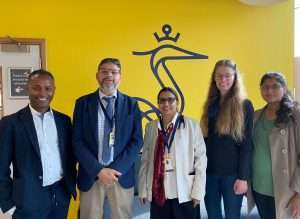 Training Working Group (Prof. Manoj Dora, Director, CISC_ Prof. Mohammad Ali, Pro-Chancellor & Dean, ARU, Cambridge, Dr Maren Schineder and Dr. Sanchita Chowdary, Research Scholars)
Training Working Group (Prof. Manoj Dora, Director, CISC_ Prof. Mohammad Ali, Pro-Chancellor & Dean, ARU, Cambridge, Dr Maren Schineder and Dr. Sanchita Chowdary, Research Scholars)
I also had personal and group discussions with research scholars and faculty on major research projects related to agri-food supply chains at CISC. The projects are collaborative and cross-disciplinary, involving partners from the UK, Asia, Latin America and Africa. One of the key projects at the centre is part of the TASA (Transforming Agrifood Systems in South Asia) initiative, which focuses on nutrition, health and food security – implemented in Bangladesh, India, Nepal, and Pakistan. The centre participates in the research on resilient agrifood systems in Bihar, India, that aims to enhance the well-being and resilience of farmers by engaging them along the food value chain. It also promotes fair access to healthy and sustainable diets for everyone. The centre works with Indian partners from various government agencies dealing with agriculture, water and rural development in the project.
Major themes of food system research focus on lean operations, data-driven supply chain management for resilience, participatory methods for value chain analysis, value stream mapping and transforming agri-food systems in South and South East Asia (Bangladesh, Indonesia, etc.). The research initiatives also include investigations that explore the concepts of a circular economy and how it applies to food supply chain management, as well as those that attempt to analyse the difficulties of shifting from linear to circular systems. Also, attempts were made to combine operational excellence tools and industry 4.0 technologies in a connected supply chain to achieve zero waste. The objective has been to derive inclusive and sustainable models of agri-food system management.
Library
A major highlight of the programme has been the 24/7 direct and online access to the university’s extensive library resources, including full access to research reports, research papers and journals. The Anglia Ruskin Research Online (ARRO) repository housed research materials and managed the entire research process from submission to publication. Reports on research programmes that focused on sustainable food production, circular economy, and Industry 4.0 tools for zero waste, climate psychology, etc., that involved interdisciplinary collaborations with global partners formed a major focus of learning through library resources. Conceptual and analytical inputs gained from library resources included lean thinking in agri-food systems, technographic approach to technology use, impact of temporal aggregation on supply chains, dimensions of climate psychology, affordance theory, social network theory, relational theory, contingent change theory and social good forecasting techniques.
Field trips
Field trips to Kevdon, London Liverpool Street, and Cambridge to explore circular waste management and lean logistics for resilient food distribution gave me new insights on sustainable waste management at the community level. I also visited Nuneaton’s community food farming clusters, a model for community-driven healthy food production and environmental well-being, supported by the Social Farms and Garden charity. The model holds potential for replication in urban centres in India through LSGI interventions.
Visits to major development research centres
The visits facilitated under the programme covered Coventry University, Institute of Development Studies, University of Sussex, and Trinity College, University of Cambridge. The visits enabled opportunities to network with international researchers and provided exposure to innovative approaches followed in development research. A meeting with the Rural Futures Research Team at IDS led by Dominic Glover and Lidia Cabral, social scientists studying food narratives, aid politics and agricultural policies in developing countries, mainly in Africa and Latin America, was insightful. The interactions on the ongoing Rural Futures research projects in African countries stressed the need for changes among young people and children in agriculture to achieve more social equity and rural sustainability gave novel perspectives to development. Various facilities and resources of the institute were visited, providing a firsthand exposure to the works of renowned experts Ian Scoones and Robert Chambers at the centre. The research group on participation, inclusion and social change – currently led by Joanna Howard – carries on the work on these themes. The Participatory Resource Centre holds the works of Robert Chambers in the field, and all his documents and publications are organized and stored here. I also got to understand how student admissions and scholarships were administered under the British Council, Commonwealth Student Fellowships.
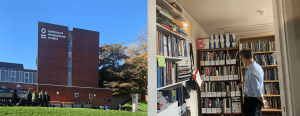 At Participatory Resource Centre, IDS (Where works of Robert Chambers are Archived) / Participatory Resource Centre IDS, University of Sussex
At Participatory Resource Centre, IDS (Where works of Robert Chambers are Archived) / Participatory Resource Centre IDS, University of Sussex
A visit to Trinity College, Cambridge, the sacred temple of science and music, gave an exceptional opportunity to dive into the legacy of great scientists and artists, – Newton, Bacon, Tennyson, Ramanujan, Amartya Sen and many others.
The Centre for Development Studies at Trinity, has a Centre of South Asian Studies, led by Prof. Shailaja Fennell, the Director. The major work of this centre included sustainable food production and rural development in India, gender roles and gender inequalities in development projects in South and Southeast Asia, the delivery of public goods, and the importance of partnerships in both Asian and African economies. The visit also included an exploration of Trinity’s Hall of Fame and the Library that housed some rare science manuscripts related to the work of such legendary Trinity men as Newton, and Ramanujan.
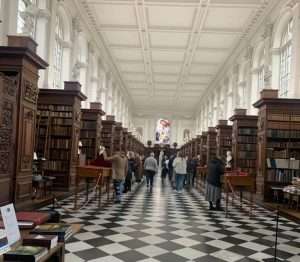 Trinity College, Cambridge Library
Trinity College, Cambridge Library
Participation in seminars
During my programme, I got to attend four academic seminars held at the university. The first one was about British Academy/Leverhulme Small Research Grants – helpful for learning how to mobilise research funds through competitive bidding. Then, there was the Dean’s Lecture Series where Dr Mohammad Ali, Dean, School of Business and Law, ARU, discussed community wealth building, even in the present stressful times of economic recession. Another seminar, led by Professor Hans De Steur from Ghent University, introduced the need for being eco-friendly consumers, especially with plant-based and biofortified foods. I also attended a seminar hosted by the academic club, where student activities, academic programmes, and making the campus culture more inclusive were discussed by representatives of students and faculty. It gave insights into the various academic programs of the university.
Programme seminar
I delivered my seminar on Risk Assessment of Supply Chains in Agricultural Enterprises. The seminar in hybrid mode had faculty and students join in, both in-person and virtually. I shared the results of student research at KAU done under my guidance, which included mapping, assessing, and ranking supply chain risks. The library resources were used to make the content match the priorities of the international audience. The interactions were helpful to fine-tune the outcomes, and it was decided to turn the seminar topic into a research paper.
MY LEARNINGS
This programme introduced me to a range of advanced methods utilized in research analysis. This included an exposure to the ARIMA model for forecasting that allows one to make predictions in a systematic manner. Further, Food Supply Chain Resilience Index development using Social Network Analysis (SNA) matrices provided valuable insights into supply chain dynamics and was used in the development of a research paper as part of the programme. The hybrid approach of combined use of DEMATEL and ANP methodologies was also a new learning. Furthermore, I got introduced to Grey Relational Algorithms (GA) and Zoho Social software which helped to augment social media analytical capabilities and data management skills.
I also attended a writing workshop organized by the centre for faculty and students that was all about crafting research papers appropriate for high-impact journals. The focus was on systematically reviewing existing literature, establishing theoretical foundations, and complementing our work with empirical evidence, while leveraging advanced analytical tools. This had a profound influence on enhancing my research writing skills and had an impact on my research methodology courses.
The programme opened exciting opportunities for self-directed learning and hands-on experience in higher education. It played a vital role in nurturing self-learning abilities and skills, particularly in emerging fields such as lean thinking, circular economy, novel foods, re-manufactured goods, resilient supply chain management, and the practical use of agricultural technology according to the affordance theory.
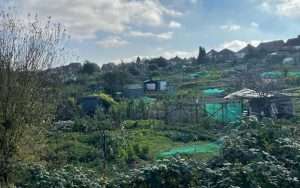 Ubran Community food clusters
Ubran Community food clusters
The entire programme was handled professionally based on a schedule prepared jointly through consultations. The schedule was meticulously followed with due flexibility whenever needed. Exposure to research communities through participation in seminars and other networking events broadened the scope for incorporating the diverse ideas gained into academic collaborations and developing an outlook to see the bigger picture. The exposure to a more open and flexible academic system widened the opportunities for developing conceptual and analytical skills in the emerging global areas of agri-food systems and supply chain management. The programme opened up immense possibilities of heutagogy and experiential learning in higher education built on self-directed principles of andragogy. It helped in the development of self-learning faculties and skills, especially in the emerging areas of agri-food supply chain resilience and sustainability.
From the understanding I gained from the visit, there exists immense possibility for fruitful cooperation between UK universities and Indian agricultural education and research centres. Even though there are already some partnerships in different fields, there is potential for more growth in emerging areas such as managing agri-food systems and strengthening supply chains. The opportunity brought in further awareness of ways to collaborate with Anglia Ruskin University to promote academic excellence, research quality and community engagement. The experience gained at ARU reveals that there is a lot of scope to improve the quality of agricultural education and research in India. The training helped in defining perspectives and fostering experience on innovative pathways in building resilient agri-food supply chains and circular economy. This assumes significance in light of the emerging transition of agriculture from primary to secondary value chain-based systems. In this changing scenario extension education will have to focus on integrating economies of scale and scope along with principles of agro-ecology and disrupting technologies to build sustainable food systems. This will have a bearing on setting up pathways to the SDG goal of zero hunger by leveraging values of food security and sovereignty to all.
Acknowledgements
I extend my heartfelt gratitude to Professor Manoj Dora, and his associates Dr Sanchita Roy Chowdhary and Dr Maren Schneider, and all other faculties and administrators for their warm welcome during the visit. Dr Peter Taylor, Director of Research at IDS was especially generous with his time and resources and I thank him wholeheartedly. Their insights and experiences were incredibly valuable in furthering my research and academic horizons. I sincerely thank and truly appreciate ICAR-NAHEP-CAAST for sponsoring this training, and KAU for deputing me to attend the programme, which greatly contributed to an enhanced learning experience.
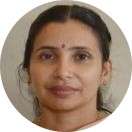 Dr Binoo P Boney is Professor & Head, Department of Agricultural Extension, College of Agriculture, Kerala Agricultural University Thrissur, Kerala, India (Email: binoo.pb@kau.in)
Dr Binoo P Boney is Professor & Head, Department of Agricultural Extension, College of Agriculture, Kerala Agricultural University Thrissur, Kerala, India (Email: binoo.pb@kau.in)

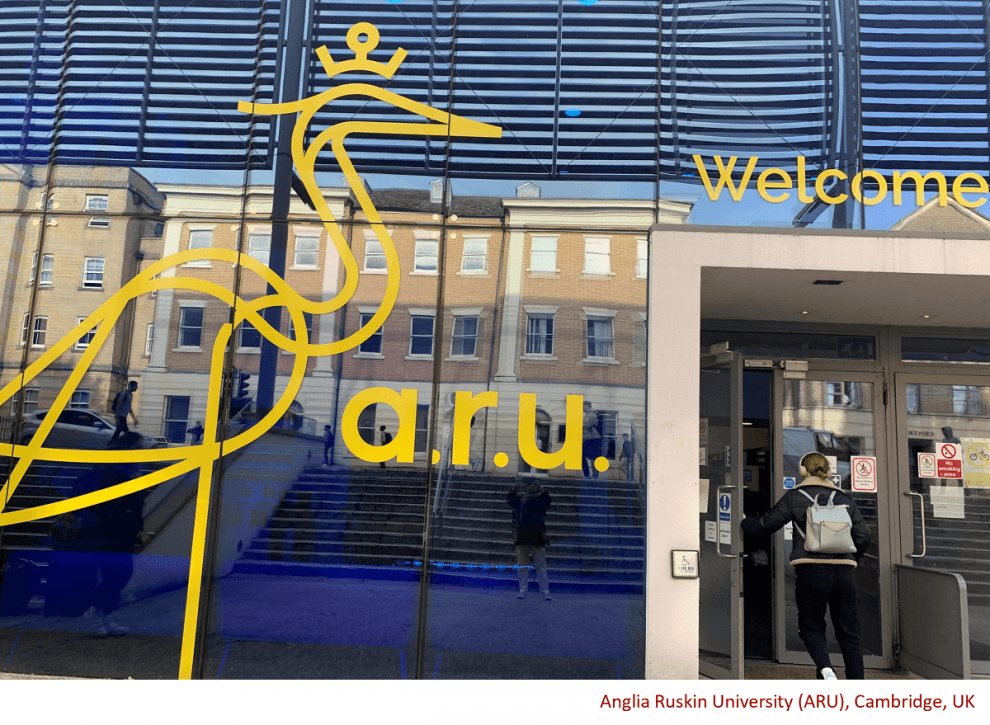

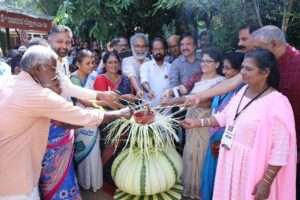

Add Comment